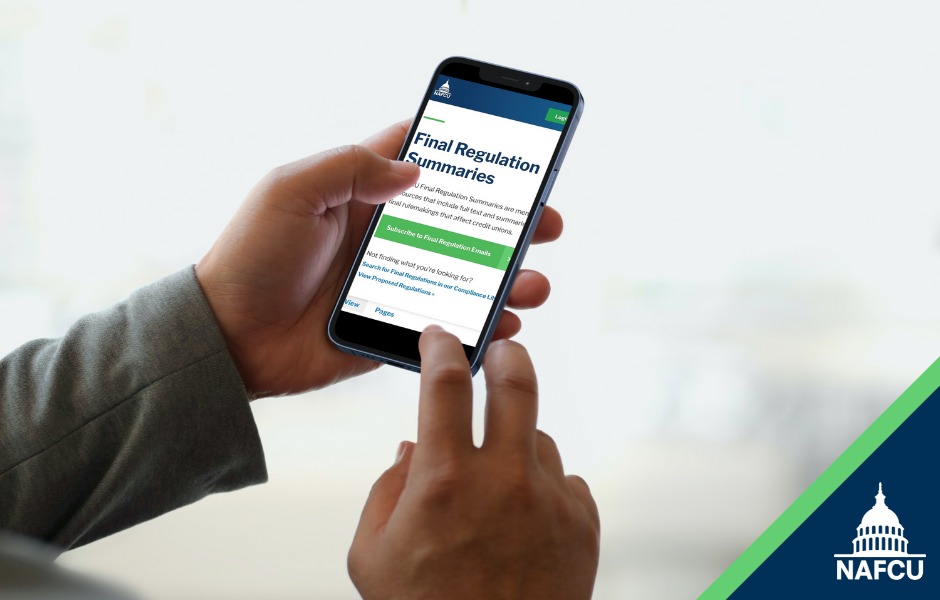Newsroom
Financial regulators discuss redlining risks, special purpose credit programs during fair lending webinar
 Federal financial regulators – including the NCUA – Tuesday hosted a webinar to discuss fair lending practices.
Federal financial regulators – including the NCUA – Tuesday hosted a webinar to discuss fair lending practices.
During the NCUA’s presentation, the agency analyzed Home Mortgage Disclosure Act (HMDA) data noting that, while the agency does not directly require credit unions to conduct any specific HMDA analysis, all credit unions that collect HMDA data could benefit in ensuring fair lending compliance. The NCUA also mentioned in relation to its supervisory priorities, that it anticipates examiners to look at fair lending in 2022.
Other agencies attending covered a wide variety of topics:
- The Department of Justice (DOJ) highlighted their redlining enforcement initiative and recent related cases;
- the Federal Housing Finance Agency (FHFA) gave brief report on data from the GSEs underwriting platforms, which reflected racial disparities in denial rates;
- the Federal Deposit Insurance Corporation (FDIC) provided an overview on redlining risks and expectations regarding the Community Reinvestment Act;
- the Federal Reserve Board (FRB) conducted an overview of artificial intelligence and machine learning, flagging potential fair lending risks for using these tools
- the Department of Housing and Urban Development (HUD) provided a summary of a Chase Bank enforcement action regarding appraisal discrimination; and
- the Office of the Comptroller of Currency (OCC) gave tips for conducting redlining risk assessments and what kinds of red flags might indicate higher risk in this area.
In addition, during the webinar the CFPB detailed special purpose credit programs and highlighted HUD’s recently released guidance clarifying that special purpose credit programs conforming with the Equal Credit Opportunity Act and Regulation B generally do not violate the Federal Fair Housing Act. The CFPB sees this as a “systemic tool” for expanding access to financial services, improving racial equity issues, and more.
View the agenda from the webinar here. NAFCU will continue to monitor these topics to ensure that credit unions have all the regulatory tools and knowledge necessary to succeed.
Share This
Related Resources
Add to Calendar 2024-06-26 14:00:00 2024-06-26 14:00:00 Gallagher Executive Compensation and Benefits Survey About the Webinar The webinar will share trends in executive pay increases, annual bonuses, and nonqualified benefit plans. Learn how to use the data charts as well as make this data actionable in order to improve your retention strategy. You’ll hear directly from the survey project manager on how to maximize the data points to gain a competitive edge in the market. Key findings on: Total compensation by asset size Nonqualified benefit plans Bonus targets and metrics Prerequisites Demographics Board expenses Watch On-Demand Web NAFCU digital@nafcu.org America/New_York public
Gallagher Executive Compensation and Benefits Survey
preferred partner
Gallagher
Webinar
Add to Calendar 2024-06-21 09:00:00 2024-06-21 09:00:00 The Evolving Role of the CISO in Credit Unions Listen On: Key Takeaways: [01:30] Being able to properly implement risk management decisions, especially in the cyber age we live in, is incredibly important so CISOs have a lot of challenges here. [02:27] Having a leader who can really communicate cyber risks and understand how ready that institution is to deal with cyber events is incredibly important. [05:36] We need to be talking about risk openly. We need to be documenting and really understanding what remediating risk looks like and how you do that strategically. [16:38] Governance, risk, compliance, and adherence to regulatory controls are all being looked at much more closely. You are also seeing other technology that is coming into the fold directly responsible for helping CISOs navigate those waters. [18:28] The reaction from the governing bodies is directly related to the needs of the position. They’re trying to help make sure that we are positioned in a way that gets us the most possibility of success, maturing our postures and protecting the institutions. Web NAFCU digital@nafcu.org America/New_York public
The Evolving Role of the CISO in Credit Unions
preferred partner
DefenseStorm
Podcast
AI in Action: Redefining Disaster Preparedness and Financial Security
Strategy
preferred partner
Allied Solutions
Blog Post
Get daily updates.
Subscribe to NAFCU today.
